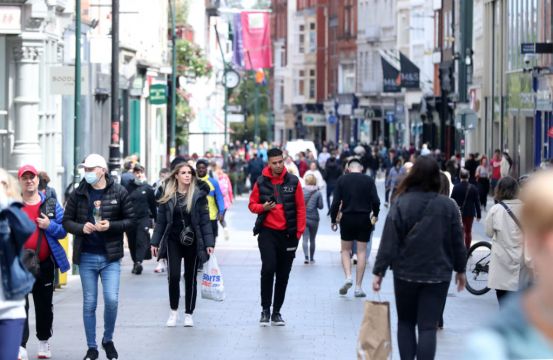Foreign Affairs Minister Simon Coveney said it was still possible to avoid a return to lockdown, amid a worrying surge in Covid-19 cases in Ireland.
Speaking on Sunday, Mr Coveney appealed to people to follow public health advice.
“It is possible to avoid the introduction of more restrictions, but we will have to watch the numbers very closely,” he said.
“Future lockdowns are not inevitable, but they require a national effort.”
Ireland is experiencing a fourth wave of the pandemic, prompting fears about the capacity of the health system to cope.
A further 4,181 Covid-19 cases were confirmed in the country on Sunday.
There were 668 patients in hospitals with the disease, with 125 in intensive care.
Mr Coveney declined to point to any specific sectors that might bear the brunt of fresh restrictions, but promised Government support to any industry affected.
The Government has faced criticism for declining to re-establish the Pandemic Unemployment Payment (PUP) for workers following the recent introduction of new measures designed to curb the spread of the virus.
Mr Coveney indicated that the payment would be on the agenda when ministers met next week at a Cabinet sub-committee, although he did not go into more detail.
We need clear Govt public health ads on ventilation and listen to those with expertise in the area and those on the frontline of our health service: “The vast majority of people acquire Covid by breathing it in”, Dr Eavan Muldoon, Consultant in infectious diseases at the Mater. https://t.co/2UuHd6dpsF
— Róisín Shortall (@RoisinShortall) November 20, 2021
He also said he “strongly expects” the Government will act as soon as next Tuesday to make antigen testing kits cheaper.
During an appearance on RTE’s The Week In Politics programme, the senior Fine Gael minister faced questions from opposition TDs about progress on antigen testing and the rollout of booster jabs.
More than 500,000 boosters have been administered in Ireland so far.
Sinn Fein TD Louise O’Reilly, appearing on the same programme, accused the Government of “dithering”.
“There is a lot of leadership that is absolutely absent,” she said.
“They have finally come around to what Sinn Fein and others have been saying on antigen testing.”
Social Democrats co-leader Roisin Shortall said: “There’s no doubt the situation is very grave and we have a very narrow window of opportunity to try to flatten the curve.”
She said that the Government had been “very, very slow” on booster jabs and that the current difficulty in booking PCR tests, amid a spike in demand among the public, was “not acceptable”.
Aontu leader Peadar Toibin said the “big failure” of the Government had also been the missed opportunity to build capacity in the hospital system and create extra beds.
Mr Coveney defended the Government saying “On antigen testing, there is a lot of antigen testing going on already and it has been going on for many months,” he said.
“We are acting with urgency regarding booster rollout.”
Strong turnout today in the Vaccination Centre in Cavan & across the country this weekend for boosters.Our actions to mitigate risk in hospitals,along with boosters & the public response to supporting the public health measures are key to get us through this tough phase @HSELive pic.twitter.com/A34mO3OW9X
— Paul Reid (@paulreiddublin) November 21, 2021
Earlier, chief medical officer Dr Tony Holohan called on people to follow the public health advice and asked anyone eligible for a booster vaccine to take it.
“We can change the trajectory of this disease,” Dr Holohan said in a statement.
“Small changes, by all of us, will make a big difference collectively.
“Together we can break the chains of transmission and bring down disease incidence. By doing so we can have a real impact on the number of people who end up seriously ill and in hospital in mid-December.”
He warned that the situation was having a dangerous impact on non-Covid care in the health system.
“The current level of Covid-19 in Ireland is having a negative impact on the health of the people of Ireland and placing an enormous burden on our entire health system, from public health to general practice to our acute hospitals,” he said.
“We are all, understandably, very tired of this pandemic.
“Time and again we have asked the Irish people to take on board public health messaging and act for the collective good. And time and again the vast majority have listened to that message and responded.”







